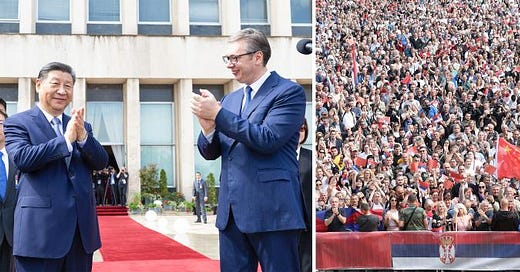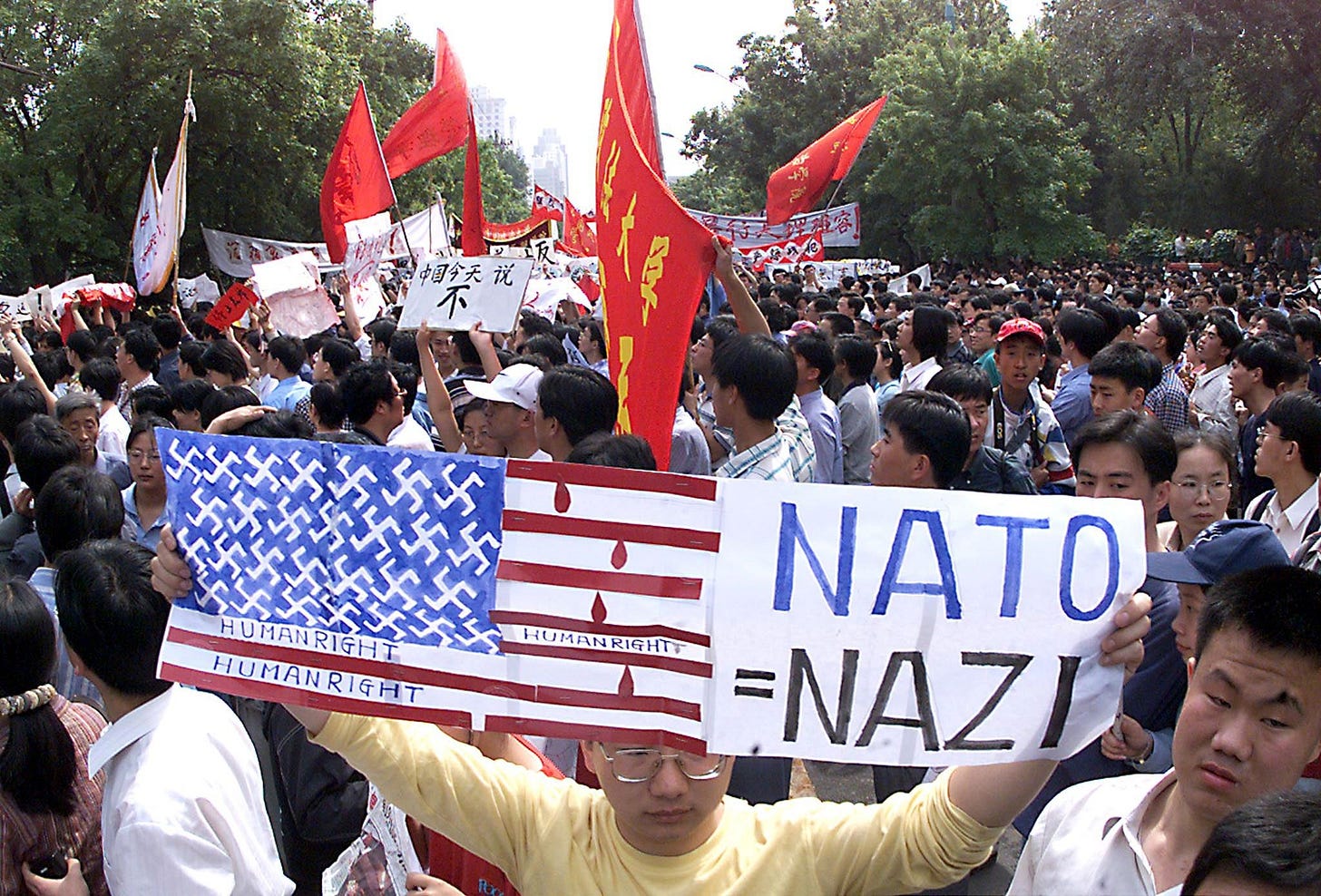Hi folks,
This week has been one of the slower ones, with not much happening. I will stick with writing at least once a week, but if not much happens for me to do a proper weekly review, and if I also have no time to write those big essays, I will simply write this kind of “short takes”.
Xi in Europe
Xi paid his first visit to Europe (ex. Russia) in 5 years. Much of the symbolism in that trip, ranging from the China-France joint statement on Gaza, to Xi’s gift to Macron, deserves some discussion. But what I find to be most interesting is his visit to Serbia, on the 25th anniversary of the US bombing of the Chinese embassy in Belgrade.
First, I want to highlight the importance of that bombing in the contemporary Chinese psyche. In 1999, I was barely 9 years old and too young to have an opinion. But I do remember the outrage during those days. It became one of the very few political events that got seared into my childhood memory during those years (alongside the handover of Hong Kong, the crackdown on Falun Gong, and 911. Not so much memory about Monica Lewinsky though.) In fact, looking back, this event marked the moment when Chinese people felt most outraged by a foreign power in the last many decades.
To this date, the official US line was that the bombing was a mistake. Almost nobody in China believed it. It’s likely that even those in the West don’t believe it, such as this famous story on The Guardian, claiming the bombing was deliberate. The Guardian story’s core thesis was that China was helping Milosevic's Yugoslavia forces by hiding the radio broadcast station inside the embassy. The US found out about it and destroyed the embassy.
I don’t know if this story is true. (Even if I know I probably will not talk about it here.) What I do know is intentionally or not, Chinese lives did get lost in Serbia, at the hands of American missiles. And despite the common exaggeration that China seems to have changed under Xi to be “more adversarial” toward the West, maybe, nothing has really changed. And whatever tension - the balloon, TikTok, the “overcapacity” - between China and the US today is almost nothing compared with the event in 1999. Just imagine what nightmarish situation we will get ourselves into if the embassy of China (or of the US) gets bombed by the other side today.
But the bright side is that, if we can get over 1999, I don’t see why we can’t get over the tension of today.
As for Xi’s Serbia visit, two things about that visit are really interesting to me.
First, I guess it’s one of the only times when a Chinese state leader greets a large crowd in a foreign country. Just from the pictures, we see at least ~10,000 people gathering there. Please note that the entire population of Serbia is around 6 million, even smaller than my hometown of Nanjing, which is a city. If the same proportion of Chinese people come out in a crowd, you will be looking at a 2-million-large crowd. I mean, you simply don’t see this kind of image that often, not for a Chinese leader in a foreign land.
Second, despite the fact that Xi arrived exactly on the 25th anniversary of the bombing, he did not pay a visit to the bombing site. It was obvious that he tried to pay tribute to that event while avoiding the impression that he was using this occasion to further antagonize the West. It was a masterful, well-balanced choice of action.
The Market
After a major rally last week in Hong Kong, the momentum lost a little bit of steam in the first half of this week, prompting Morgan Stanley to make the call that the current rally will “abate”, only to see the index finishing even higher later this week.
Generally, I think there is just too much noise in the world. Way too much of our attention is wasted on these noises in the news cycles.
That is essentially why this newsletter of mine exists for you: clearing out the noise, getting down to the basics, putting things in perspective, and looking through a long-term view.
And no, I don’t think the current rally is a one-trick pony anymore. For my core reasoning, please revisit my commentary last week. And as I said last week, the remaining skepticism in the market only serves as the proof that the rally is not over anytime soon.
Some discussion about the future of this newsletter
Now let me me talk about this newsletter itself. It’s been more than 7 months since I started to write here. Through these many months, I have proven at least one important thing to myself, that I can commit to writing at least once a week even while working as a full-time CEO.
At the same time, I see this newsletter less and less as just a personal hobby (I love writing! Otherwise I can’t keep doing it consistently). Instead, I see it as something more and more integrated with what my company is doing.
I consider myself one of the lucky people who blend what I love to do with what I do for a living. And what I do at BigOne Lab and at Baiguan is absolutely what I love to do: providing honest, balanced, and high-value information for the world. In this sense, this newsletter is no different from those projects. I am quite sure that this is something I will do for life, and to me, the lines between myself, the company, the Baiguan newsletter, and this newsletter become increasingly blurry.
So, to help create more synergy between those different projects, I am contemplating introducing paid features to this one. My rough thinking about it is that I will keep most of the content for free. But for the weekly review, I will keep it paid for the first few days (like the first 5 days?), so the more time-conscious bunch among you may pay for timeliness and punctuality.
Also, if you are a paid subscriber of Baiguan, I am thinking about giving you complimentary access to this newsletter, so you don’t need to pay twice.
Pricing will simply be $10/month or $100/year.
Will you pay for this kind of arrangement?
Further discussion about the name of this newsletter
It’s also high time we talk about the name of this newsletter “Lost in Translation 迷失南京”. I explained on the About page about why is it “Lost in Translation”. But I have never explained the Chinese characters in it, “迷失南京”, which translates as “Lost in Nanjing”.
I just mentioned, Nanjing is the city where I was born and raised. It’s major metropolis on the bank of the Yangtze River, some 300 kilometers (170 miles) upstream from Shanghai. Famously, Nanjing was the capital of China for at least 6 (short-lived) imperial dynasties. All of those 6 dynasties were at best “ regional dynasties” for Southern China (such as the Kingdom of Wu in the Romance of Three Kingdoms), and never got to be one of those “big” dynasties such as the Tang or the Ming, who ruled the entire China proper for several centuries.
All of those “mini-dynasties” in Nanjing were also short-lived. And if you count some of the even more short-lived polities, including Taiping Heavenly Kingdom and Chiang Kai-shek’s erstwhile KMT regime, Nanjing has been a center of power for China for at least 10 times, throughout the millennia. This city also marked the nadir of the “Century of Humiliation” for China, because of our “Rape of Nanking” fame.
Long story short: Nanjingers have seen stuff, usually the more fragile and futile part of that “stuff”, and usually through the perspective of an onlooker standing on the periphery. We never really get ourselves to the center of the stage. But this vantage point sometimes qualifies us as good, overall balanced observers.
The reason I included “Nanjing南京” into the name of this newsletter was also because of a small wordplay. When people think of “Lost in Translation”, most of you will think of the 2003 film by Sophia Coppola, starring Bill Murray and Scarlett Johansson. But you may not know the Chinese translated name of the movie is, artfully, 迷失东京, or “Lost in Tokyo”. In Chinese, Tokyo is pronounced as “Dongjing”, or the “Eastern Capital” (It’s also the real Japanese meaning of Tokyo, the eastern capital, as opposed to the previous “western capital” of Kyoto).
“Jing京” means the capital. Nanjing means the “southern capital”, and Beijing means the “northern capital”. So in fact, Nanjing is the only city in China (other than Beijing) that also carries a “Jing” in her name. So I replaced “Tokyo” with “Nanjing” in this name, to highlight my Nanjing roots, and also to link with “Lost in Translation” the movie, a subtle piece of art about the futility of cross-cultural understanding that I watched multiple times.
Ironically, a major downside of using “Lost in Translation” is that the movie was so successful, that it would take perhaps decades for my substack to ever get to appear on the first page of a Google search. It’s just hard to set a distinct brand identity around this name.
At the same time, some of my Chinese subscribers often “mistakenly” refer to this newsletter as “Lost in Nanjing”, instead of “Lost in Translation”.
So, I am thinking, hey, maybe those subscribers are right. Maybe I should simply call this thing Lost in Nanjing instead.
What do you think?







Also, if you have better name suggestions, let me know!
Interesting, I was really taken aback when a Chinese friend said the bomb hitting the Chinese embassy in Belgrade was intentional. This is very much not a mainstream view in the West, even from papers such as the Guardian. It's very counterintuitive because the cost-benefit makes no sense at all from the US/NATO side. So I think most people here would not understand the level of the Chinese reaction, or the significance in memory. That said, the Xi state visit to Serbia didn't seem to seek to antagonize or relitigate, at least from the reporting I saw.
Serbia seems to be in an interesting place at the moment. Perhaps very quietly edging away from Russia and towards the EU. With the intention of being like Hungary, unaligned and playing all sides.